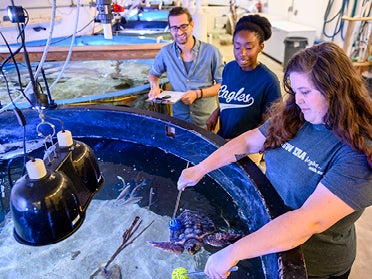Learn the science of behavior to become an agent of evidence-based, positive change in organizations and the lives of individuals.
Locations
- Armstrong Campus (In Person)
Why Earn a Master’s in Psychology at Georgia Southern?
- Enter a rapidly growing field with competitive pay.
- Southeast Georgia’s only master’s program in behavior analysis.
- Prepare to become a certified behavior analyst.
- Study in historic Savannah, Georgia.
- 31 credit hours to completion.
Acquire the knowledge and strategies to help shift behavior in a positive direction, making a visible and vital impact on the lives of others. Georgia Southern University’s Master of Science (M.S.) in Psychology with a concentration in Behavior Analysis program prepares you for this rewarding and growing field through rigorous coursework in foundational theory and techniques for application.
You’ll have the opportunity to work directly with faculty in research and also to complete a practicum, allowing you to explore and apply the principles of behavior analysis in a variety of real-world contexts. The curriculum is verified by the Association for Behavior Analysis International (ABAI), meaning it fulfills the educational component you need for recognition as a Board Certified Behavior Analyst (BCBA), a key credential for advancement in the field.
Graduate ready to start applying your skills in the workplace or take your studies further with a doctoral degree.
Ready to Apply?
What Can You Do With a Master’s in Behavior Analysis?
Prepare to understand a patient’s habits and patterns and design interventions in a wide range of settings, from primary education to business operations to animal training. Gain additional hours of supervised fieldwork to pursue certification as a Board Certified Behavioral Analyst (BCBA), or leverage your skills to enter related areas like instructional design or human resources management.
Where our graduates work:
- Government agencies
- Hospitals
- Human resources departments
- Mental health centers and clinics
- Schools
What our graduates do:
- Behavior Therapist (BT)
- Board Certified Assistant Behavior Analyst (BCaBA)
- Board Certified Behavior Analyst (BCBA)
- Certified Autism Specialist (CAS)
- Classroom behavior specialist
- Human resources specialist
- Market research analyst
- Organizational behavior management specialist
- Registered Behavior Technician (RBT)
- Researcher
What You’ll Learn
You’ll begin your studies by examining the core concepts and principles of behavioral analysis, observing them in practice with nonhuman animals, and learning about research methods and ethics in the discipline.
Then, go deeper, developing your knowledge of behavior assessments along with treatment strategies and techniques. In the process, you’ll discover how to design and implement intervention strategies and analyze the results.
If you are planning to pursue BCBA certification, a practicum option lets you complete some of the required hours of supervised, applied experience. You may also choose to undertake independent research, ideal preparation for applying for doctoral studies.
See the CurriculumBuild Your Experience
Extend your learning and professional development beyond the classroom to strengthen your skills and connection with the profession as you prepare for the next steps in your career.

Practicum in Behavior Analysis
Engage in the applied practice of behavior analysis under the supervision of experienced mentors. You’ll learn how to apply the principles you’ve studied to a variety of contexts and populations.

Independent Research
Working closely with a faculty advisor, pursue your own research project in behavior analysis. You’ll understand the discipline more deeply as you apply core concepts to an area that interests you.

Student Organizations
Get involved in campus events and community outreach, attend professional conferences, build your network and forge friendships with like-minded individuals in student-led groups like Get Psych’d and Psi Chi.
Want to Learn More?
Explore essential information about our M.S. in Psychology, Behavioral Analysis program, including application details, accreditation status, and licensing disclosures. Gain insight into the program’s credibility and requirements to help you start your journey toward success with the knowledge you need.
The M.S. in Psychology, Behavioral Analysis program is open to those with a bachelor’s degree from a regionally accredited institution with a cumulative GPA of at least 3.00 (on a 4.0 scale). You must have taken Introduction to Psychology, Introduction to Special Education, Introduction to Behavior Analysis or a course in a similar discipline.
We strongly encourage students to obtain applied clinical or research experience as an undergraduate.
To apply, please submit:
- An online application. (There is a $50 non-refundable application fee.)
- A personal statement that includes:
- A description of career goals and how behavior analysis and/or professional certification in behavior analysis helps you reach them.
- An account of your reasons for applying for graduate study at Georgia Southern University.
- A list of academic achievements, nonacademic achievements and relevant work experience.
- A self-evaluation of maturity level and character.
- Three letters of recommendation from individuals who can speak of your undergraduate academic performance, potential for graduate study, and maturity level and character. At least one letter must be from a faculty member. Have the letters sent directly to gradadmissions@georgiasouthern.edu.
- Transcripts for all prior college-level work. Copies can be uploaded with your application; Official copies sent directly to the Office of Graduate Admissions will be required for admitted students.
- Official GRE scores. Minimum Graduate Record Exam (GRE) scores are 147 on the Verbal section and 146 on the Quantitative section for applicants who took the exam after July 31, 2011. NOTE: The GRE will be OPTIONAL for applicants applying for Fall 2024 admission. You may still provide GRE scores, but you are not required to do so.
Submit your personal statement and CV to gradadmissions@georgiasouthern.edu.
Application Deadlines:
All students admitted to the program begin in the fall semester. The application deadline is December 15.
Your application and all required documents must be received by the deadline.
Provisional Admission:
For applicants who meet two out of three of the following criteria for regular admission (GRE-V, GRE-Q, GPA), provisional admission may be granted by the departmental graduate faculty based on their consideration of the materials submitted by the applicant.
Contact Information
Dr. Andrew Bulla
Graduate Program Coordinator
abulla@georgiasouthern.edu
912-344-2803
Georgia Southern’s master’s program in behavior analysis is Association for Behavior Analysis International (ABAI)-verified, meaning it is a training program that offers the coursework required for eligibility for certification as a Board Certified Behavior Analyst (BCBA). The program is not ABAI-accredited.
Related Programs

Take the Next Step
Prepare to help individuals, organizations and communities thrive with a master’s in behavior analysis from Georgia Southern University.
Contact the Department of Psychology:
Statesboro Campus:
Brannen Hall, 1010
P. O. Box 8041
Statesboro, GA 30460-8041
Phone: 912-478-5539
Fax: 912-478-0751
Email: tboyer@georgiasouthern.edu
Armstrong Campus:
Science Center, 201
Savannah, GA 31419
Phone: 912-344-2762
Email: jlwilliams@georgiasouthern.edu


